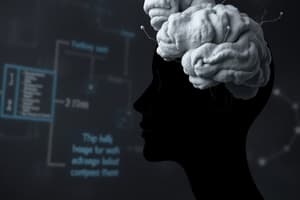Podcast
Questions and Answers
What is learning?
What is learning?
a relatively permanent change in behavior due to experience
What is classical conditioning?
What is classical conditioning?
learning to associate stimuli with outcomes
What is a neutral stimulus (NS)?
What is a neutral stimulus (NS)?
A stimulus that does not produce a particular response before conditioning
What is an unconditioned stimulus (UCS)?
What is an unconditioned stimulus (UCS)?
What is an unconditioned response (UCR)?
What is an unconditioned response (UCR)?
What is a conditioned stimulus (CS)?
What is a conditioned stimulus (CS)?
What is a conditioned response (CR)?
What is a conditioned response (CR)?
What is acquisition in classical conditioning?
What is acquisition in classical conditioning?
What is higher order conditioning?
What is higher order conditioning?
What is extinction in classical conditioning?
What is extinction in classical conditioning?
What is generalization in classical conditioning?
What is generalization in classical conditioning?
What is discrimination in classical conditioning?
What is discrimination in classical conditioning?
What factors make classical conditioning most effective?
What factors make classical conditioning most effective?
What does the Rescorla and Wagner model explain?
What does the Rescorla and Wagner model explain?
What is orienting in psychology?
What is orienting in psychology?
What is blocking in classical conditioning?
What is blocking in classical conditioning?
What was Watson's 'Little Albert' experiment?
What was Watson's 'Little Albert' experiment?
How can conditioning relate to drug overdoses?
How can conditioning relate to drug overdoses?
What is operant conditioning?
What is operant conditioning?
What is Thorndike's law of effect?
What is Thorndike's law of effect?
What is positive reinforcement?
What is positive reinforcement?
What is negative reinforcement?
What is negative reinforcement?
What is positive punishment?
What is positive punishment?
What is negative punishment?
What is negative punishment?
What is spontaneous recovery?
What is spontaneous recovery?
What is shaping in operant conditioning?
What is shaping in operant conditioning?
What is generalization as it pertains to psychology?
What is generalization as it pertains to psychology?
Flashcards are hidden until you start studying
Study Notes
Learning Concepts
- Learning refers to a relatively permanent change in behavior stemming from experience.
- Classical conditioning involves associating stimuli with outcomes, where a neutral stimulus elicits a response after pairing with an unconditioned stimulus.
Classical Conditioning Elements
- Neutral Stimulus (NS): A stimulus that initially does not provoke a response (e.g., a bell before conditioning).
- Unconditioned Stimulus (UCS): A stimulus that naturally evokes a response without prior conditioning (e.g., food).
- Unconditioned Response (UCR): The unlearned response to the UCS, such as salivation when food is present.
- Conditioned Stimulus (CS): A previously neutral stimulus that begins to elicit a response after being paired with the UCS (e.g., the bell after conditioning).
- Conditioned Response (CR): The learned response to the conditioned stimulus (e.g., salivation in response to the bell).
Acquisition and Conditioning
- Acquisition marks the initial stage of classical conditioning, where the NS and UCS are linked to elicit the CR.
- Higher Order Conditioning occurs when a new stimulus is paired with a CS to create another CS.
- Extinction is the process of uncoupling the CS from the UCS, leading to the diminishment of the CR.
Stimulus Interaction
- Generalization occurs when stimuli similar to the original CS also produce the CR.
- Discrimination is the ability to differentiate between similar stimuli, where one is consistently paired with the UCS and the other is not.
Effective Classical Conditioning
- Success in classical conditioning is influenced by timing (CS precedes UCS), consistency of pairing, uniqueness, and the novelty or surprise of the UCS.
Models and Mechanisms
- The Rescorla and Wagner model emphasizes that animals pay attention to factors causing novel experiences; surprising UCS draw attention to environmental cues.
- Orienting refers to the attention animals give to new stimuli.
- Blocking indicates that once a CS is learned, it can prevent the learning of a new CS.
Notable Experiments
- Watson's "Little Albert" experiment: Associated a white rat (NS) with a fear-inducing UCS, causing generalization of fear to all small rodents.
Drug Conditioning
- Drugs in novel settings can lead to overdoses due to insufficient compensatory reactions that normally anticipate the drug's effects.
Operant Conditioning
- Operant conditioning uses outcomes to influence behaviors, where the consequences of actions affect their future likelihood.
- Thorndike’s Law of Effect states that responses followed by satisfying outcomes are strengthened, while those followed by negative outcomes are weakened.
Reinforcement Types
- Positive Reinforcement: Increases behaviors by introducing positive stimuli (e.g., giving food).
- Negative Reinforcement: Increases behaviors by removing negative stimuli (e.g., stopping an electric shock).
- Positive Punishment: Weakens a response by presenting an aversive stimulus post-response.
- Negative Punishment: Weakens behavior by removing a desirable stimulus after the behavior occurs.
Responses and Recovery
- Spontaneous Recovery refers to the reappearance of a weakened CR after a period of extinction.
- Shaping involves reinforcing progressively closer approximations to the desired behavior (e.g., guiding a pigeon to turn in a circle).
Generalization in Psychology
- Generalization allows responses learned from one stimulus to be applied to similar stimuli, facilitating behavioral adaptation.
Continuous Reinforcement
- Involves reinforcing a behavior every time it occurs, promoting rapid learning but may lead to rapid extinction when reinforcements stop.
Studying That Suits You
Use AI to generate personalized quizzes and flashcards to suit your learning preferences.




